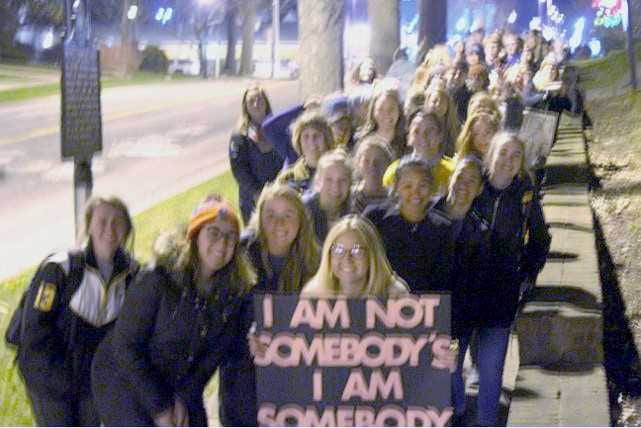BY COLLEEN COYLE – STAFF WRITER
This article is a member of a series focused on Diversity at Centre College.
Frequently, I find myself amazed at the opportunities I have had for female mentorship on Centre’s campus. I look around and think that surely campus has always been filled with powerful women who conduct groundbreaking research, publish at the highest levels, and who are deeply respected by the members of this campus. However, during March I am reminded that Centre College was not always this way – it did not admit female students until 1926, and even then, it wasn’t until 1964, with integration, that all women could attend Centre.
March gives students the opportunity not only to examine women’s history in a national or global context, but in a Centre context. This process means different things to different students, as Centre has come a long way in some respects of gender equality, but has miles to go in others. All Centre students should, when given the opportunity, consider how Centre has been shaped by powerful females.
Speaking to women on campus at Centre, I discovered a central theme that each person considered critical to success: networking. Speaking with Devin Baker, who coordinated the women’s march that occurred on campus last week, Baker noted that the march had a turnout of 250 participants and that there were “many more faculty and staff who reached out and shared their support of the march, even if they could not attend.”
Similarly, Dr. Cadavid, Dr. Haile, and Dean Fabritius all noted the critical nature of networking for women in academic and professional spheres, emphasizing how critical it was to their own success. Dr. Cadavid shared the process by which she and other female faculty began organizing a social event each semester that allowed them to socialize free of normal work place pressures. This has helped to create interdisciplinary research opportunities between faculty, as women from all academic fields meet one another and can collaborate on projects. Elaborating on the experience of these meetings, Dr. Cadavid noted, “this allowed us to recognize similarities in our experience as well as give us a chance to help each other overcome some of these challenges, and it has also created natural mentorships.” Additionally, Dean Fabritius, the first woman to hold office as a chief academic officer at Centre, remarked that female students seeking a future in the academic or professional world should “find those mentors who can help you and don’t be afraid to fail because fear of failure sometimes prevents us from pushing forward.”
Though Centre has certainly progressed over the years, there are still ways to improve. For example, academics are investigating nationally how student evaluations tend to reflect negative perceptions of female professors. Studies indicate that if students in online courses believe their professors to be female, they evaluate them lower than students who took the same online course but believed their professor to be male. “There have been efforts to support some gender diversity and really value that gender diversity. I’ve been here ten years, and I think in ten years it’s possible that [the problem of evaluations] won’t be a thing” notes Dr. Haile. This is a type of challenges that may not be obvious but is an important step to increasing support for female faculty at Centre.
Another way that Centre has changed to become more supportive of female faculty is with the adoption of a concrete maternity policy. Dean Fabritius, Dr. Haile, and Dr. Cadavid, all noted how important this step was to creating a more diverse and supportive campus.
Our female faculty and students deserve to be celebrated and supported for their accomplishments. For example, the Phenomenal Woman campaign organized by Sister To Sister celebrated the exceptional nature of African American women both on Centre’s Campus and elsewhere.
Excellence is also evident at the female faculty research level. Dr. Cadavid specializes in three different areas of research, including the philosophy of mathematics and metaphysics. Dr. Haile researches enzymatic and bacterial behavior in larger life systems. Dean Fabritius’s research focuses on wasps and their genetic manipulation of gender. There are countless more examples of women who achieve at the highest levels and smash barriers as they go.
For those of us who aspire to be like them, Dr. Haile gave these words: “you have to support your other female colleagues and other colleagues in general. It’s easy to say that I got treated like dirt so I can treat others like dirt…but if there’s an opportunity to facilitate cooperation do that. The other thing is that you should always feel free to take initiative…its highly valued and underdone.” Creating a network of powerful women can be the first step to a fulfilling and empowering academic career, so that, as Devin Baker puts it, “we can celebrate the women who came before us…so we can make our own little part of history.”
